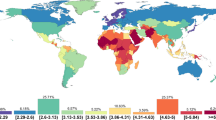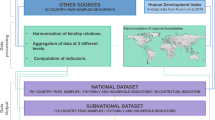Abstract
Two topics are presented in this paper: a short history of the Polish economic transformation, begun in 1989, and analyses of aggregate data describing the life conditions of Polish households in the period immediately following the transformation.
Similar content being viewed by others
References
Blazyca, G., & Rapacki, R. (1996). Continuity and change in Polish economic policy: The impact of the 1993 election. Europe-Asia Studies, 48(1), 85–100.
Crane, K. (1991). Institutional legacies and the economic, social, and political environment for transition in Hungary and Poland. American Economic Review, 81(2), 318–322.
Gajewski, S. (1992). Consumer behavior in economics of shortage. Journal of Business Research, 24(1), 5–10.
Gross, J. T. (1992). Poland: From civil society to political nation. In I. Boone (Ed.), Eastern Europe in revolution (pp. 56–71). Ithaca, NY: Cornell University Press.
Hill, R. (1949). Families under stress: Adjustment to the crises of war separation and reunion. New York: Harper Bros.
Kepka, M. (1997, 8 April). The science system in Poland with particular regard to foreign co-operation and special consideration to the USA and the Federal Republic of Germany. GAAC Leopoldina Symposium, Scientific Research in Universities, Academies, and Extra-University Institutions of Central Eastern European Countries, Germany and the USA: Approaches, Experiences, Perspectives. Halle, Germany.
Kennedy, R. E. (1997). A tale of two economies: Economic restructuring in post-socialist Poland. World Development, 25(6), 841–865.
Kolodko, G. W., & Rutkowski, M. (1991). The problem of transition from a socialist to a free market economy: The case of Poland. Journal of Social, Political and Economic Studies, 16(2), 159–179.
Kramer, M. (1995). Polish workers and the post-Communist transition, 1989–1993. Communist and Post-Communist Studies, 28(1), 71–114.
Lane, T. D. (1992). Transforming Poland's economy. Finance & Development, 29(2), 10–13.
Lipton, D. & Sachs, J. (1990). Creating a market economy in eastern Europe: The Case of Poland. Brookings Papers on Economic Activity, 1, 75–147.
Morris, E. W., Winter, M., Whiteford, M. B., & Randall, D., C. (1990). Adjustment, adaptation, regeneration, and the impact of disasters on housing and households: A prologue to research. Housing and Society, 17(1), 1–26.
Palaszewska-Reindl, T., Swietlikowska, U., Gutkowska, K., Zelazna, K., & Jezewska, M. (1992). Raport o sytuacji roozinnych gospodarstw domowych w polsce I socjalnobytowych warunkack ich funkcjonowania (Report on the situation and functioning of family households in Poland and their socioeconomic conditions). Warsaw: Faculty of Human Nutrition and Home Economics, Warsaw Agricultural University.
Sachs, J. (1992, March). Building a market economy in Poland. Scientific American, 266, 34–40.
Slay, B. (1994). The Polish economy: Crisis, reform, and transformation. Princeton, NJ: Princeton University Press.
Svejnar, J. (1991). Microeconomic issues in the transition to a market economy. Journal of Economic Perspectives, 5, 123–138.
Sztompka, P. (1996). Looking back: The year 1989 as a cultural and civilizational break. Communist and Post-Communist Studies, 29(2), 115–129.
Timár, J. (1995). Particular features of employment and unemployment in the present stage of transformation of the post-socialist countries. Europe-Asia Studies, 47(4), 633–649.
Vincent, C. E. (1966). Familia spongia: The adaptive function. Journal of Marriage and the Family, 28(1), 29–36.
Winiecki, J. (1994). East-Central Europe: A regional survey—The Czech Republic, Hungary, Poland, and Slovakia in 1993. Europe-Asia Studies, 46(5), 709–734.
Zagórski, K. (1994). Hope factor, inequality, and legitimacy of systemic transformations: The case of Poland. Communist and Post-Communist Studies, 27(4), 357–376c.
Zubek, V. (1997). The eclipse of Walesa's political career. Europe-Asia Studies, 49(1), 107–124.
Author information
Authors and Affiliations
Rights and permissions
About this article
Cite this article
Pałlaszewska-Reindl, T. Polish Households During the Economic Transformation. Journal of Family and Economic Issues 19, 221–234 (1998). https://doi.org/10.1023/A:1022958723104
Issue Date:
DOI: https://doi.org/10.1023/A:1022958723104




